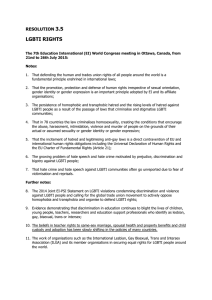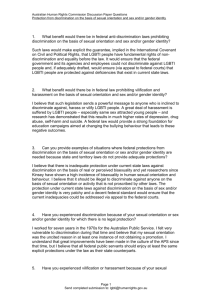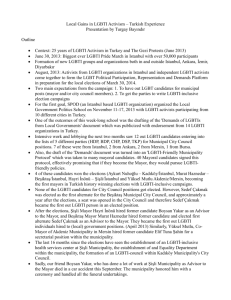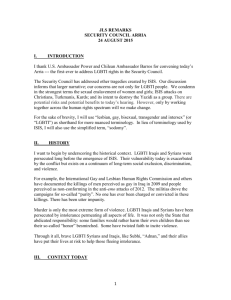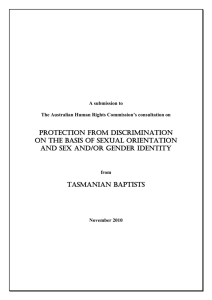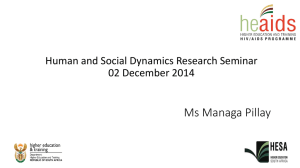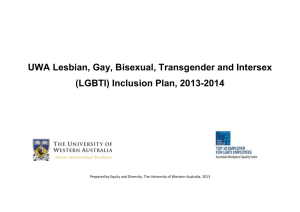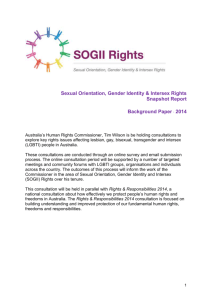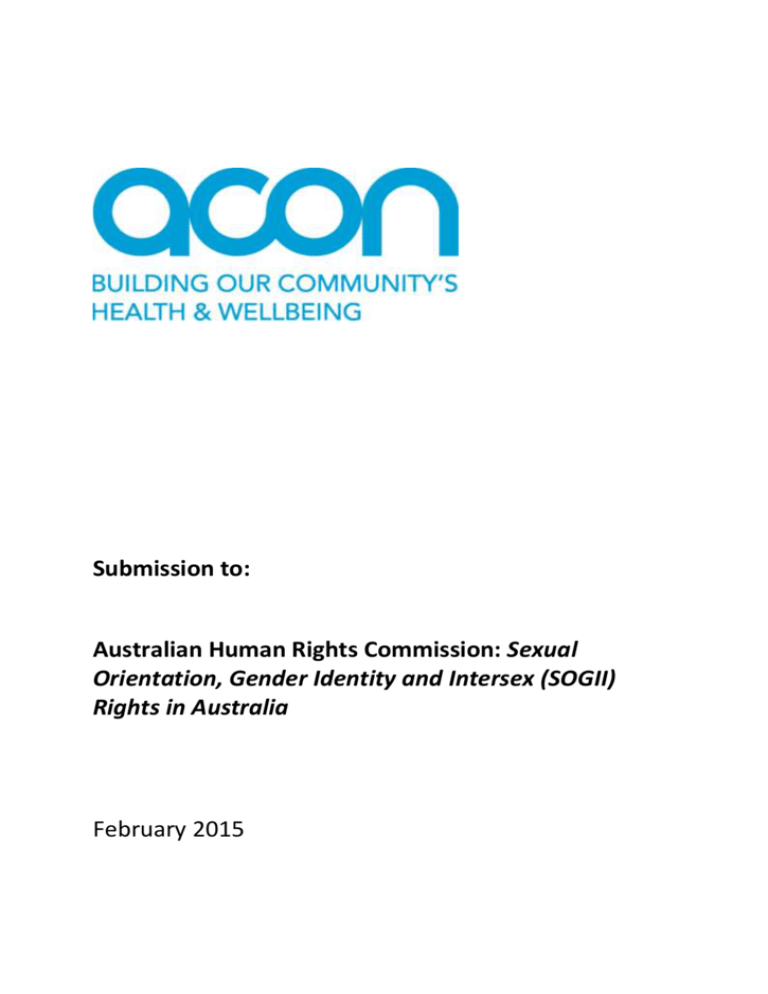
Submission to:
Australian Human Rights Commission: Sexual
Orientation, Gender Identity and Intersex (SOGII)
Rights in Australia
February 2015
Our interest in human rights
ACON works within a framework that advocates for a society that protects and promotes human
rights as the foundation for good health. Working towards a society where human rights violations
are reduced and prevented are important to achieving better health outcomes for our communities.
We believe that addressing stigma and discrimination is an important part of this goal, and therefore
we have focused our comments on these issues.
What are some specific and ongoing issues that require the protection of SOGII rights?
Discrimination in services
Reports including One Size Does Not Fit All1, Writing Themselves In 32, Private Lives3, and Uncloseting
Discrimination4 document the experiences of discrimination across a range of settings, including
DFV, mental health and disability services, and schools. The experiences of ACON clients suggest that
that these reports are representative of the experiences of discrimination in other service settings.
Common to these experiences is that the discrimination often happens at particular points of
vulnerability for those people – exactly the time when discrimination can have its harshest impacts.
Many instances of discrimination against LGBTI people occur in institutions controlled by religious
organisations that operate in the secular public sphere, for example, aged care facilities, disability
support services, schools and hospitals. With the receipt of public funding, and the implicit authority
of the state to perform government functions, these organisations should be subject to the same
obligations as the government, including the obligation not to discriminate. They should also be
subject to the same regulatory framework as other NGOs operating in the same space; otherwise an
unequal regulatory environment will continue to exist.
Violence, harassment and abuse
Action must also be undertaken to end violence, abuse and harassment against LGBTI people. In the
2012 Private Lives Survey, 25.5% of respondents experienced homophobic abuse or harassment in
the previous 12 months and 8.7% had experienced threats of or actual physical violence. A large
national study into young LGBTI people released in 2010 reported that 61% experienced verbal
abuse and 18% experienced physical abuse5.
Given the disproportionate levels of violence experienced by the LGBTI community, across all age
groups, a comprehensive national action plan should be developed to end violence, abuse and
harassment.
Involuntary or coerced sterilisation of intersex people
1
Constable A, de Castro N, Knapman R and Baulch M, One Size Does Not Fit All: Executive Gap Analysis of NSW domestic
violence support services in relation to GLBTI communities' needs, ACON 2011. NSW Gay and Lesbian Rights Lobby, The Pink
Ceiling is Too Low, (2003).
2 L Hillier, T Jones, M Monagle et. al., Writing themselves in 3: The third national study on the sexual health and wellbeing
of same sex attracted and gender questioning young people, Australian Research Centre in Sex, Health and Society, La
Trobe University, (2010)
3 Australian Research Centre in Sex, Health & Society, Private Lives: a report on the health and wellbeing of GLBTI
Australians, (2006)
4 NSW Gay and Lesbian Rights Lobby, Uncloseting Discrimination: Consultation Report on the Intersections of
Discrimination, (2012).
5
L Hillier, T Jones, M Monagle et. Al (2010) op.cit
Involuntary or coerced sterilisation and cosmetic ‘sex normalising’ surgery on children with intersex
variations must come to an end. The Australian Senate Community Affairs Committee Report on the
Involuntary or Coerced Sterilisation of Intersex People in Australia raised a series of issues that need
urgent attention. The recommendations from this report must be addressed to ensure that
fundamental rights relating to bodily integrity are upheld. We understand that Organisation Intersex
International Australia is making a submission to this inquiry and a number of people with intersex
variations have responded to the associated survey. Their voices must be heard and the issues they
raise must be addressed to advance SOGII rights.
What legal protections currently exist, and how effective are they?
Anti-discrimination legislation
The Anti-Discrimination Act 1977 (NSW) (ADA) and the Sex Discrimination Act 1984 (C’th) (SDA)
provide anti-discrimination protections to members of the LGBTI communities in NSW to varying
degrees. The SDA provides anti-discrimination protection to all groups, and was drafted with a
contemporary understanding of SOGII rights. However, it does not provide anti-vilification
protection. The ADA provides anti-discrimination and vilification protection on the grounds of
homosexuality and transgender status. The protection provided to bisexual people is inadequate,
and the coverage to intersex people is non-existent. Difficulties exist for people making complaints
under both Acts.
Religious exemptions from anti-discrimination legislation contained in the ADA and SDA negatively
impact on the experiences of LGBTI people, and unduly restrict their rights. They amount to state
sanctioned discrimination for those religious and private educational authorities that are exempted.
They also send a message to the community that it is acceptable to treat members of the LGBTI
communities unfavourably. Current exemptions, as they exist in the Commonwealth and NSW law,
are too broad and indefinite, whereas they should be minimal, temporary and specific.
Consultations held by ACON with older LGBT people reveal a high level of awareness of these
exemptions and a high level of anxiety in relation to them, resulting in some cases in avoidance of
services or the avoidance of disclosure. This results in reduced health seeking behaviours and can
leave providers in a position of being unable to provide an appropriate service as a consequence of
clients’ reluctance to disclose information about their sexuality, gender status or intersex status.
What is currently being done, and what more could be done to promote a culture of respect for
SOGII rights?
Legislation is vital to providing redress for LGBTI people where discrimination and vilification has
occurred. As mentioned above, older members of the LGBTI communities feel a sense of
vulnerability when confronted with the possibility of relying on services that are run by religious
organisations and therefore exempt from the ADA.
Community level work also needs to be undertaken to address people’s attitudes to, and knowledge
of, the experiences of LGBTI people. This work is a means to prevent acts of discrimination from
occurring in the first place, through enabling greater acceptance and social inclusion. ACON is aware
of or has been involved in supporting, developing or implementing a number of important initiatives
that work to build a culture of respect for LGBTI rights including:
Wear it Purple, a youth-led organisation that exists to support and empower sexuality and
gender diverse young people
Mental Health Association Mental Health Month grants, which ACON sponsors, to support a
number of events, usually in regional or remote locations, which demonstrate visible
support for LGTBI people
Anti-homophobia codes for sports
A collaboration with Reach Out/Inspire Foundation produced the Freedom Stories, videos in
which LGBTI young people talk about coming to terms with their sexuality and/or gender
This is Oz, an online photo gallery aimed at fighting discrimination against LGBTI
communities
The Safe Schools Coalition, which aims to make schools safer and more inclusive for LGBTI
young people
The Rainbow Tick, an accreditation program to assess and certify organisations as meeting
standards of inclusive service delivery for LGBTI people
Pride in Diversity, a workplace program designed specifically to assist Australian employers
provide inclusive environments LGBTI employees and make the most of their human
resources
These programs, and others like them, need to be supported, evaluated and further promoted. This
work, along with legislative reform, is required to ensure that the rights of LGBTI people are
respected and upheld in practice.

